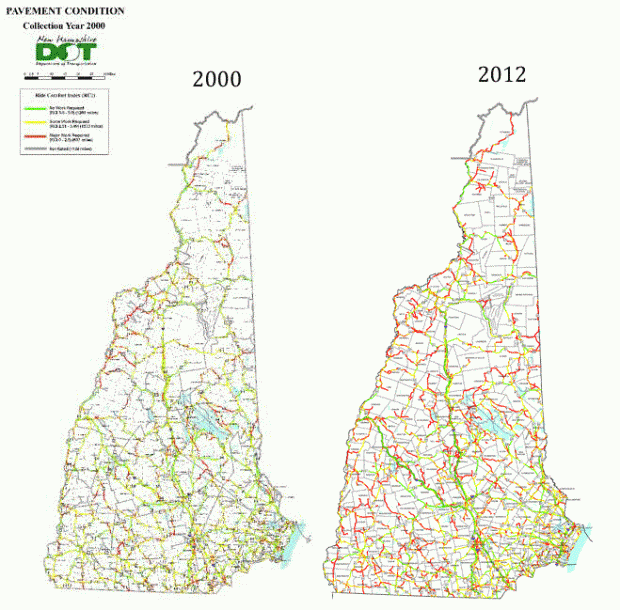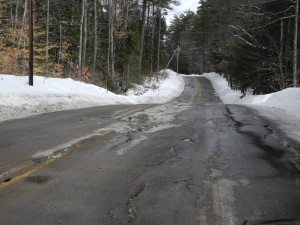How Bad Are N.H. Roads, Really?
Part I of our Roads series.
This week on StateImpact NH: a three-part series on roads. Transportation funding is a big issue in the legislature this session. A fifteen-cent gas tax has gotten initial support in the House, and advocates of high stakes gambling in New Hampshire say a portion of the revenue from a casino would go directly into the state’s Highway Fund. But getting either proposal through both chambers will be a doozy. So, we’re digging into roads.
First, we look at just how bad our roads are. Next, we’ll tell you the 5 reasons our roads are so beat up. And finally what that means for your car, your pocketbook, and your safety.
Also, share your road story.
_______________
So, How Bad Are New Hampshire Roads?
Valerie and Berthold Horn say one road they drive on in Conway could win a “worst road in New Hampshire” contest, hands down.
We have had literally thousands of dollars of car repairs as a result of driving on East Conway Rd. and Green Hill Rd. during the last three years. Unfortunately for us, there is no other way to get to work, or shopping, or anything else for that matter.
StateImpact NH has heard from a lot of disgruntled Granite Staters, who say the roads they drive on are terrible. And it’s true: the quality of New Hampshire’s roads has been steadily declining. Oil prices are pushing paving costs up, fuel-efficient cars mean fewer gas tax dollars for the state’s Highway Fund, and inflation means those dollars buy less, too.
Today, 37 percent of state-maintained roads and highways are deemed “in poor condition” by the state’s Department of Transportation. Under current funding, that will increase to 43 percent by 2016. And bad roads are getting worse. That’s because it costs twenty times as much to reconstruct a badly maintained road than to resurface one in decent condition. “Fixing worst first,” says Bill Boynton at NHDOT, “you’ll never catch up.”
That’s why people like the Horns say they’re baffled that public workers are repaving the part of the roads that are “actually in reasonable shape.” It costs $50,000 to repave a decently maintained road, and $1 million to reconstruct a failed road.On top of that, the state prioritizes road repair projects based on traffic patterns. So while interstates may stay in excellent condition, roads less travelled are likely to fall deeper and deeper into disrepair.
Check out this NHDOT graphic, which compares road conditions from 2000 and 2012.

NHDOT
Miles of roads in poor condition have increased throughout the state. Red lines indicate poor condition, yellow indicate fair, and green indicate good condition roads. All roads are state roads.
Including funding for the I-93 expansion, Boynton says New Hampshire would need $74 million each year just to maintain current road and bridge conditions. To fix all state-owned roads and bridges would cost $1.3 billion dollars.
Of course, state roads make up only 30 percent of New Hampshire roads. Towns are struggling to maintain their roads too, perhaps even more so than the state. While NHDOT is on track to repave each road every thirteen years or so — three years slower than NHDOT would like — many towns in New Hampshire are on track to repave their roads every 100 years.
“Infrastructure is a big line item,” says Beth Hamilton at the University of New Hampshire’s Technology Transfer Center, which works with municipal public works departments across the state. But, she says, it’s often impossible for towns to choose road repair over education, police and firemen — not to mention more urgent road expenses, like plowing, or rebuilding roads lost to storm damage.
Stay tuned for the next segment of our roads series tomorrow morning, here at StateImpact New Hampshire. And, send us your photos!



